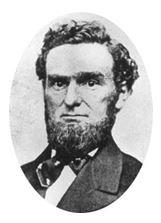Alexander Cameron Hunt
- Territorial Governor of Colorado from 1867-1869
- Party: Republican
View a description of holdings held at the Archives
Biography
Judge of the Vigilante Committee of the Territory
Appointed as Territorial Governor
Alexander Cameron Hunt, the fourth territorial governor of the Colorado Territory from 1867-1869, was born in New York City on January 12, 1825. Soon after his birth his family moved to Freeport, Illinois where he was educated and later served as mayor.
Judge of the Vigilante Committee of the Territory
Hunt traveled to California in 1850 to find his fortune, and did fairly well until he lost his wealth in the Wall Street Panic of 1857. After this episode, Hunt traveled to Colorado and the Cherry Creek area where gold was found in 1858. Desperadoes and vigilante mobs terrorized Cherry Creek prospectors which Hunt believed to be an unacceptable situation. He was soon chosen to be Judge of the Vigilante Committee of the Territory, a committee which effectively cleared this undesirable element from the community by conducting a series of hangings.
Appointed as Territorial Governor
When the Territory of Colorado was formed, Hunt's actions were rewarded with a presidential appointment as United States Marshal for the Territory, a position he held for five years. He was also appointed Ex-Officio Superintendent of Indian Affairs, an office that he continued to hold throughout his governorship. In 1867 Hunt ran for a congressional seat against George Chilcot. During this controversial election there was evidence of voting fraud, and as such the matter was reviewed by the House Committee of Elections in Washington. While Chilcot was the congressional races\' victor, Hunt was appointed as Territorial Governor on April 24, 1867.
Hunts Administration
Hunt's administration was dominated by conflicts between Indian tribes, primarily the Utes and other Plains Indians, and white settlers. Indian uprisings had become so common and violent that Hal Sayre, the Adjutant General, created volunteer forces to protect property and life. The Indian problem became so severe that Central City offered money for Indian scalps, a measure that probably did not help the situation. Tension grew with word that the native Ute Tribe was seriously considering joining efforts with other Plains Tribes, a prospect that made people living in settled areas fear for their existence. Hunt\'s previous relationship with the Utes as Ex-Officio of Indian Affairs, however, helped to relieve this tension. In February of 1868 the Ute Chiefs, Indian agents, and President Andrew Johnson were brought together by Hunt to discuss a possible peace treaty. An agreement was reached which forced the Utes to vacate all lands east of the 107th meridian. The federal government chose not to honor their end of the bargain by reneging on the promised food and products. Understandably the Utes were upset, and began to strengthen their ties with the Arapahoe and other Plains Indian tribes. Hunt personally defused the situation by traveling from camp to camp and discussing the problem with the Ute leadership.
An agreement with the Utes, however, did not dissuade the Arapahoes. The following August, Schuyer Colfax, Samuel Bowles, Governor Bross of Illinois, Governor Hunt, and several prominent Denver families went camping near Buena Vista. Meanwhile, a party of Arapahoe warriors was seen traveling toward the campground. Territorial Secretary Frank Hall quickly created a volunteer army which was sent out to protect the camping notables. Luckily a messenger reached the Colorado Governor first so that Hunt was able to utilize his friendship with the Ute Tribe and obtain an armed escort back to Denver. When Colfax returned to Washington he pushed officials to create a larger military presence in the Colorado Territory, and praised the heroism of both the Colorado pioneers as well as the Ute braves who had escorted the camping group back to Denver.
Legislatively, little was accomplished during Hunt's term, but the decision to move the territorial capitol from Golden to Denver was finalized on December 9, 1867. The Seventh Session legislature also created a penitentiary in Canon City during his term.
Relieved from Duty
Despite Hunt's conscientious efforts as Territorial Governor of Colorado, President Ulysses S. Grant relieved him from duty in order to offer a friend, Edward McCook, the governorship. Hunt, however, continued to contribute his various skills to the Territory after his unexpected fall from grace. He was instrumental in the development of the Denver Pacific Railroad and Kansas Pacific Railroad. Furthermore, he is credited with introducing the first bee colony to Denver, and pioneering the use of alfalfa in Weld County.
Alexander Cameron Hunt died in May, 1894, and is buried at the Congressional Cemetery in Washington, D.C.
To Request a Record
To search our records, please see Archives Search.
To request a record from the Archives, please submit a formal request.
- See also our associated fees
